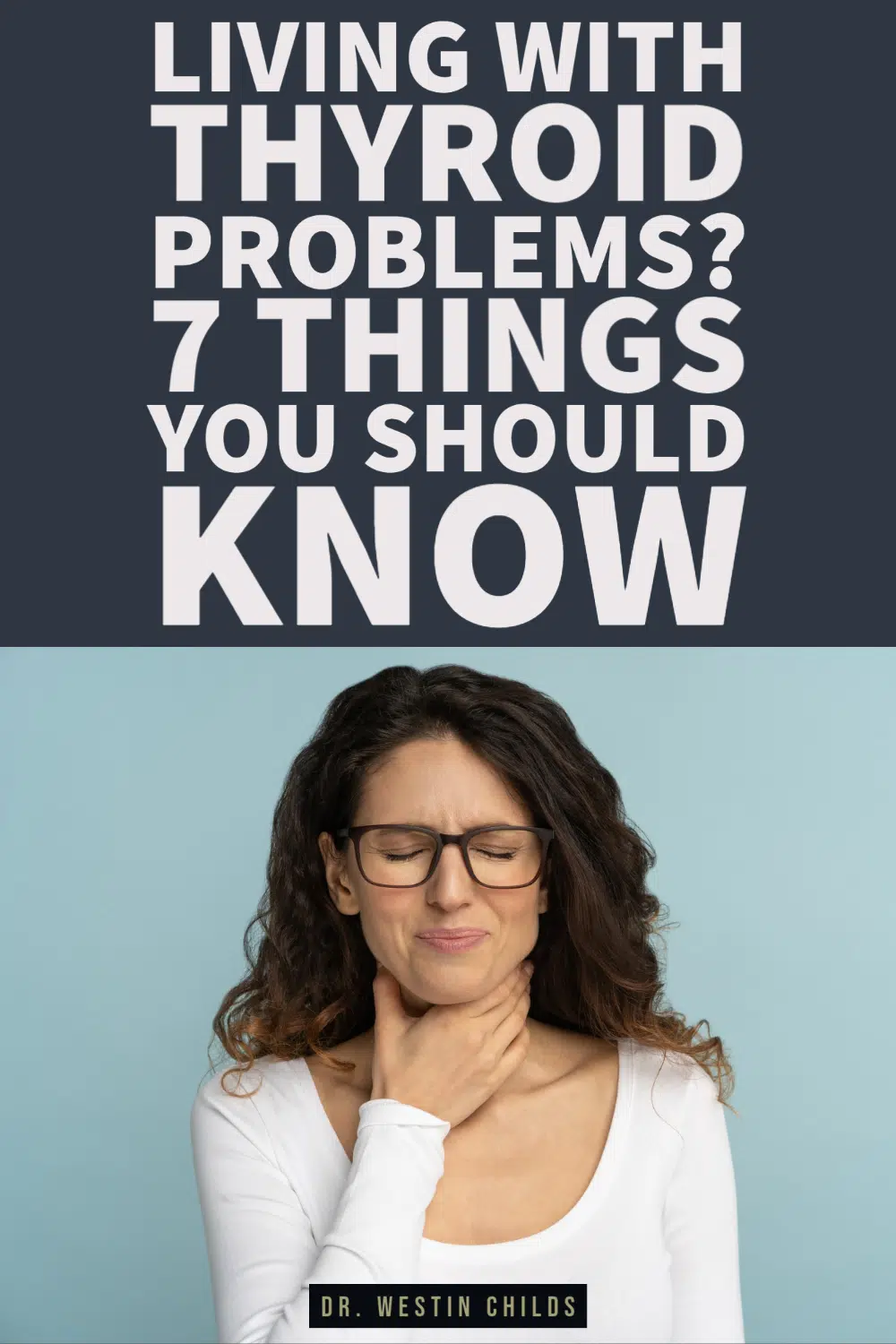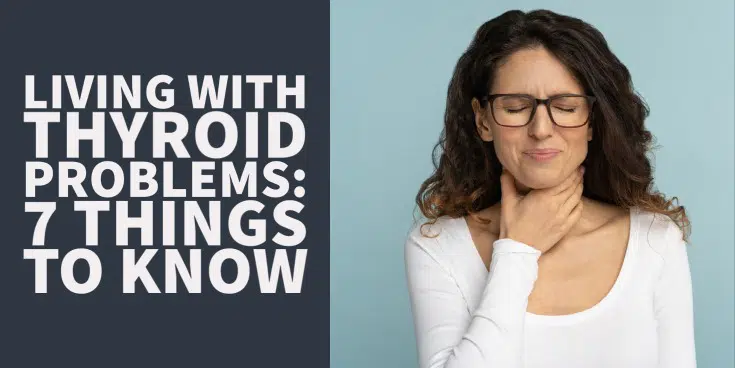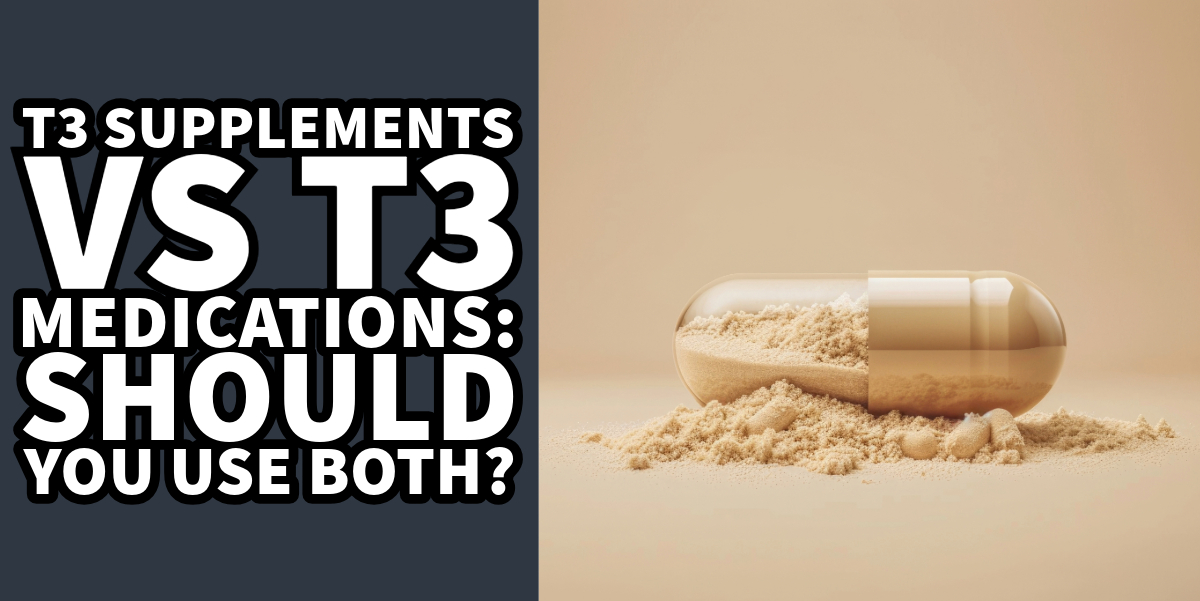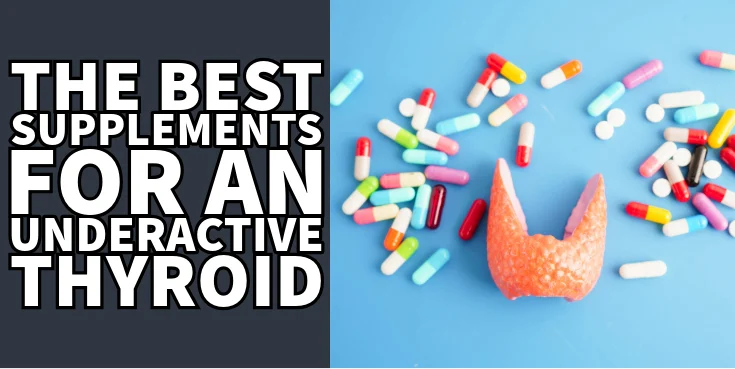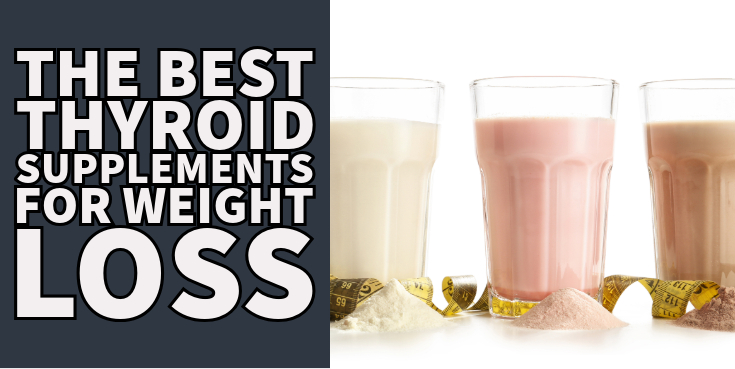Let’s talk about how thyroid disease can impact your life.
Did you know that being diagnosed with a thyroid problem means that you will experience life-changing symptoms?
Did you know that these symptoms may persist for the rest of your life?
Having a thyroid problem is no joke because it’s what I refer to as the master regulator of your hormones.
Your thyroid helps to control and regulate other hormones (1) in your body which, in turn, can impact functions such as your metabolism, your mood, your mental clarity, your hair, your digestion, and much more.
I’ve been helping thyroid patients for around 6 years and I’ve learned quite a bit in that time.
And one that I wish was more common was a simple understanding of what thyroid patients (both existing thyroid patients and future thyroid patients) face.
If thyroid patients were armed with this information then they would be better equipped to deal with their doctors, to advocate for better treatments, to better manage their relationships, and much more.
Unfortunately, most thyroid patients are not equipped with this information which means they can easily be swayed by the incorrect opinions of doctors and even other thyroid patients!
Some thyroid patients may spend years (or even decades) of their life before they learn this important information all on their own.
So allow me to set you on the fast track. Let’s save you years of learning so you can get on the path to feeling better right now.
And, by the way, this information applies to ANYONE that has a thyroid problem and regardless of how long you’ve had that thyroid issue.
With that in mind, let’s jump in:
DOWNLOAD FREE RESOURCES
Foods to Avoid if you Have Thyroid Problems:
I’ve found that these 10 foods cause the most problems for thyroid patients. Learn which foods you should avoid if you have thyroid disease of any type.
The Complete List of Thyroid Lab tests:
The list includes optimal ranges, normal ranges, and the complete list of tests you need to diagnose and manage thyroid disease correctly!
#1. It will be Harder for You to Lose weight Compared to People Without a Thyroid Problem.
Every single thing on this list is important but this is something that you need to be aware of right away.
The fact is that because you have a thyroid problem it will be more difficult for you to lose weight compared to someone who has a functioning thyroid gland.
I know, it’s unfair, but that’s just the way it is, and here’s why:
Your thyroid gland helps to control about 60% of your metabolism (2).
That means a huge percentage of the calories that you burn on a daily basis stem from how well your thyroid gland is working.
If you have a hypothyroid or low thyroid condition then you better believe that your caloric burn will be less than the average person.
So if you go about trying to manage your weight by reducing your calories, it’s just not going to work very well and may actually cause thyroid problems.
This, by the way, is why it’s so easy for thyroid patients to pack on the pounds even while watching what they eat.
The good news is that it doesn’t mean it will be impossible for you to lose weight but it does mean that you will need to be much more aggressive in your weight loss efforts compared to those with a normal thyroid gland.
It also means that copying people who use standard weight loss tactics is not a good idea.
Let’s take, for instance, the keto diet:
Imagine you have a girlfriend (with a normal thyroid gland) that hops on the keto diet and loses 20 pounds.
So you think to yourself, “I should do that too!”.
Because you have a thyroid problem, you can expect to get results equal to about half of whatever she experienced (and that’s assuming that the keto diet works for you! There’s good evidence to suggest it may be harmful to thyroid patients).
This applies to pretty much any healthy weight loss diet, method, or tactic.
Your weight loss success will take about twice as long as the average person and you will lose weight at about half of the rate.
But let me be clear:
This information all assumes that your thyroid medication is not optimized.
If you can optimize your thyroid medication (usually with a combo of T4 and T3) and if you can get your metabolism back to normal, then it will pretty much be as if you do not have a thyroid problem.
We will talk more about how this works in later options so stay tuned.
But if you are someone who goes to a standard endocrinologist or family practice doctor and gets on a dose of levothyroxine that is optimized based on your TSH, you can expect this 50% reduction in your weight loss efforts.
#2. Doctors May Not Take Your Symptoms Seriously.
This is something that is incredibly frustrating for thyroid patients and is something that you may have already dealt with (or will deal with, if you haven’t already).
Doctors live in this box in which they believe that managing thyroid function is easy.
They believe that if your TSH is in the normal range that your thyroid is perfectly normal.
But what ends up happening is this:
Your TSH will be “normal” but you will still experience low thyroid symptoms such as weight gain, fatigue, hair loss, weight gain, cold intolerance, and other low thyroid symptoms.

And when you bring these symptoms up to your doctor they will tell you that it couldn’t possibly be related to your thyroid because it’s “normal”.
Has this happened to you?
Some even take it a step further and blame your symptoms on depression, old age, and menopause.
Here’s why this is such a big deal:
If you are a thyroid patient experiencing this problem then you might be thinking to yourself that it may be true or that you are just crazy.
After all, you would assume that your doctor would know best, right?
But when you start to hear other experiences from thyroid patients you quickly realize that this is the norm and that many other thyroid patients are experiencing the exact same thing!
In fact, if you have experienced this issue please let me know below.
The truth is that you are not crazy.
The entire reason I have this website and produce so much information on the thyroid is to explain why this occurs!
If doctors did a good job treating thyroid patients then there would be no reason for my website to even exist.
Just like I mentioned in #1 above, managing your thyroid symptoms will require looking beyond the TSH and using thyroid medications that contain both T4 and T3 thyroid hormones.
#3. Some Thyroid Problems can be Reversed or Cured (But not all).
It is absolutely the case that some people will be able to reverse or cure their thyroid condition.
But you will find that this runs contrary to the advice given by most doctors.
When you start taking thyroid medication your doctor will probably tell you that you will need to be on it for the rest of your life.
But this isn’t always the case!
There are many causes of thyroid disease that can be reversed, especially if they are caught early enough!
Some conditions which can be reversed or cured include:
- Hypothyroidism caused by Hashimoto’s thyroiditis – Hashimoto’s, especially if caught early, can be reversed or at least put into remission in some people.
- Hypothyroidism from nutrient deficiencies – There are many reversible causes of hypothyroidism including zinc deficiency, selenium deficiency, and vitamin A deficiency. If your thyroid problem is from a nutrient deficiency then it will improve when you replace it!
- Hypothyroidism caused by infections, viruses, trauma, or inflammation – Viruses, trauma, and inflammation can all cause temporary low thyroid states which tend to resolve within about a year or so.
- Hypothyroidism caused after pregnancy – Some women experience postpartum thyroiditis which is often reversible and goes away on its own.
- Hypothyroidism caused by iodine deficiency – Iodine deficiency used to be the most common cause of reversible hypothyroidism and, more recently, is increasing in prevalence.
- Hypothyroidism from unknown causes – We don’t always know what caused a thyroid problem so if you don’t know then it may be the case that your thyroid problem was caused by one of the potentially reversible causes listed above.
Even if your particular flavor of thyroid disease is NOT reversible, you should still have the mindset that you are going to go all-in and try to reverse it.
Here’s why:
If you go all in and get as aggressive as possible with natural and medical therapies and along the way you discover that your disease can’t be reversed, well you have done a lot of good in the process.
Many of the natural therapies that I recommend (which you can check out here) have the added bonus of reducing inflammation, assisting with weight loss, and helping your thyroid medication do its job.
No one ever got hurt by eating more healthy whole foods, exercising more regularly, taking supplements, or making sure they exercise consistently.
There’s virtually no downside to doing these things and the potential upside is huge, even if you can’t reverse your condition completely.
If you can get off of your thyroid medication then it means you can be free of seeing your doctor every 3-6 months and getting your blood checked at the same interval!
Getting off of your thyroid medication means saving a huge amount of both money and time.
#4. Some Days you may Feel Better Than Others.
It’s pretty standard and normal for thyroid patients to have good days and bad days.
The reason for this is simple:
When doctors replace the function of your thyroid gland with a prescription medication, they are giving you a single daily dose of thyroid hormone that is supposed to last all day.
This is not at all what happens with your own thyroid gland when it is healthy.
In fact, it’s the exact opposite.
In the healthy setting, your thyroid gland is constantly producing thyroid hormone as it needs to throughout the day (3).
If you find yourself in a particularly stressful situation, if you are sick, if you’ve gained weight, etc., then your thyroid gland will automatically compensate for this by changing how much thyroid hormone it produces or converts.
But what happens if you are taking thyroid medication?
You lose the power to make these adjustments!
A single daily dose of thyroid hormone in the form of levothyroxine or Synthroid is better than nothing, but it’s nowhere near as efficient as your own thyroid gland.
The result is that you will have some days where you are feeling great and others that you are feeling much worse and this is fairly normal.
By the way, this same thing occurs even when you are taking forms of thyroid medication such as Natural Desiccated Thyroid or Cytomel/liothyronine.
It may happen less frequently on these thyroid medications but it will still happen.
This brings us to #5…
#5. Your Dose of Thyroid Medication Will Likely Change Throughout Your Life.
A lot of thyroid patients wrongly believe that once they find their “dose” of thyroid medication that they will be on that dose for the rest of their life.
Some even go as far as to stop seeing their doctor when they feel that they get there!
But the truth is that your dose of thyroid medication is very likely to change throughout your life.
Remember:
Changes to your stress, changes to your weight, changes to your health, new diagnoses, and even dieting, can all change how much thyroid hormone you need.
And guess what?
If you are taking thyroid medication, your body will not be able to compensate for these changes which means that you will have to make changes to your thyroid medication dose.
One of the most common scenarios in which thyroid patients need dose adjustments has to do with weight gain.
The more weight that you gain the more likely that you are to need to adjust your dose of thyroid medication upward.
But if you gain weight and do NOT change your dose then you will be more likely to gain even more weight.
This also works on the flip side as well:
I talk a lot about natural therapies that thyroid patients can do without their doctors.
Many of these therapies, if done correctly, can help your thyroid work better on its own.
If you take supplements, change your diet, focus on reducing your stress, lose weight, and improve your sleep quality, there’s a good chance that you can lower your dose of thyroid medication.
If you are taking thyroid medication and something has changed in your life that you think will impact your dose of thyroid medication then make sure you go to your doctor to get your thyroid labs rechecked and make adjustments as necessary.
#6. You May Not Need to be on Thyroid Medication Forever.
The standard advice that thyroid patients get from their doctor is that once they start taking thyroid medication they will need to be on it for the rest of their life.
But is this really true?
Not exactly and new studies (4) have shown that there are many people taking thyroid medication that don’t need to be on it.
Why do so many people get “stuck” taking thyroid medication?
Because no one ever bothered to ask two very simple questions:
#1. Why were you put on thyroid medication?
And #2. Is it possible for you to get off of it?
Most doctors are more concerned with IF instead of WHY.
They want to know IF you need thyroid medication not WHY.
As a result, tons and tons of thyroid patients get put on thyroid medication and kept on it for years or even decades.
And while it may have been the case that you did need to be on thyroid medication at some point in your life, it may not be the case that you need to be on it now.
This really goes along well with my previous statement about the reversible causes of hypothyroidism.
If you are like most people taking thyroid medication then you will probably never know why exactly your thyroid started to go slow down.
All you know is that you felt terrible, your doctor diagnosed you with a sluggish thyroid, and you’ve been taking thyroid medication ever since.
But there will be no way to ever know if you can get off of your thyroid medication unless you give it a shot.
You may find that you are one of the lucky few thyroid patients that can get off of their thyroid medication either because you never needed to be on it, to begin with, or because whatever caused your problem is now gone.
The idea of trying to get off of your thyroid medication is probably not something that your doctor is going to bring up, though!
So if you think that this is something you’d like to try then you will have to start that conversation.
And do make sure that your doctor is on board before you start making changes to your thyroid medication!
If you find that you want to give it a shot then check out this resource which can help you wean off of your thyroid medication the safe way.
#7. If you are Treated Correctly you can get Back to 100% (Or Close to it).
If you are getting depressed after reading numbers #1-#6 don’t because this is the one that matters most!
No matter what type of thyroid problem you have, I want you to know that it is possible to get back to 100% (or close to it).
I’m leaving some wiggle room here because not everyone will be able to get to 100% of normal but they should still be able to get to 90% or 95% which is still much better than the average thyroid patient.
Based on my own experience in helping thousands of thyroid patients, and the thyroid patient experience surveys, it’s safe to assume that the average thyroid patient is living at around 70% of “normal”.
If we put this into context, it’s like thyroid patients are C students at living their life (at no fault of their own!).
They are living day to day with 70% of their normal energy levels, with 70% of their normal metabolism, with 70% of their normal hair growth, with 70% of normal gut function, and so on.
But here’s the good news:
It’s almost always possible to get back to your normal pre-thyroid life or as close to 100% as possible!
Yes, it will be hard and yes, it may take some time, but it can be done and it should be your goal.
This is possible even for those people who don’t have reversible thyroid conditions, it’s possible for people without a thyroid, and it’s possible for people who must take thyroid medication for the rest of their life.
How is it done?
- By optimizing your thyroid medication dose (usually with a combination of T4 and T3 thyroid hormone)
- By finding the right doctor who can help guide you
- By taking thyroid support supplements
- By changing your diet
- By managing your stress
- By exercising regularly
- By paying attention to how well your body can detox
- By ensuring that you get quality sleep every night
The part most people get stuck on is finding the right doctor.
If you are working with a doctor right now that is not helping you or who is trying to blame your symptoms on everything else aside from your thyroid, then it’s probably time to seek out a second opinion.
Don’t waste your time on doctors that aren’t interested in helping you get back to 100%.
They don’t live life in your shoes. You are the one that has to live with pain, hair loss, fatigue, weakness, and weight gain every day.
If that sounds like you then it’s time to take your health into your own hands so you can start feeling better.
If you need help finding a doctor then make sure to check out this resource.
Wrapping it Up
Even though living with thyroid problems can be very difficult, it doesn’t have to be that way forever.
There are some things you won’t be able to change but there are many other factors that are still within your control!
Spend the time and energy now to find a good doctor who can help you guide you back to 100%.
Spending your time and energy will prevent you from wasting years of your life feeling poorly.
Now I want to hear from you:
Are you new to the world of thyroid management? Or are you a veteran thyroid patient?
What type of advice would you give to someone who is just starting out?
Are there things you wish you would have known years ago that you now know?
Do you have anything to add to my list?
Leave your questions or comments below!
Scientific References
#1. https://www.ncbi.nlm.nih.gov/books/NBK537039/
#2. https://www.ncbi.nlm.nih.gov/pmc/articles/PMC4044302/
#3. https://www.ncbi.nlm.nih.gov/books/NBK279388/
#4. https://pubmed.ncbi.nlm.nih.gov/11117336/
